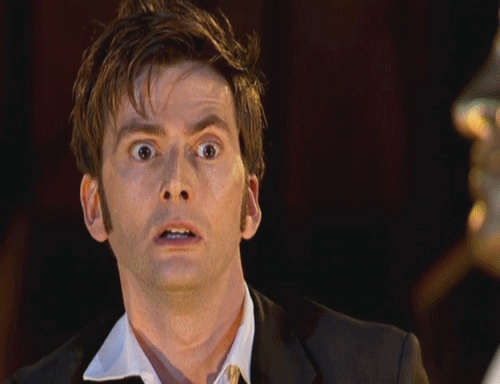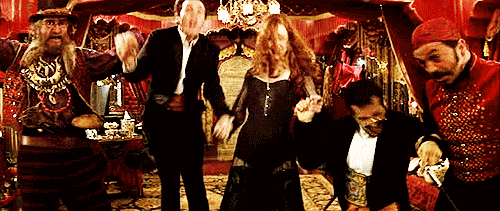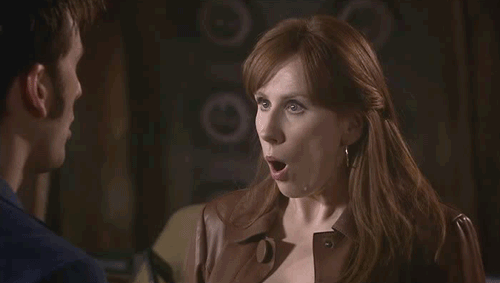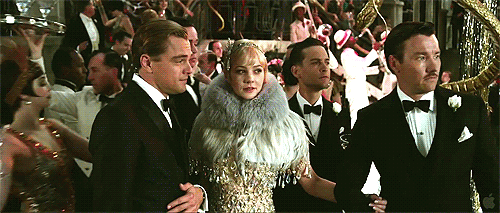You may or may not be aware that we just passed the 10th anniversary of the final episode of Buffy the Vampire Slayer, a show that, despite its silly name, is often considered by both fans and critics to be one of the greatest shows of all time. I admit, I held out on this show for a while. I saw the original movie, and it was terrible. So although the show premiered while I was still in high school, and although I had friends who watched and loved it, I didn’t think it would be for me. I wasn’t really into teen shows, and I wasn’t into vampires.
Years later, after graduating college, I got a job working the graveyard shift at a hotel. It. Sucked. But one day, as I ate “lunch” at 4:00 p.m. while preparing for work, I turned on the TV. My options were limited. But eventually, my channel surfing paused on a show that looked interesting. The dialogue was snappy and smart. The characters seemed interesting. And holy whoa, suddenly there was kung-fu. While snarking.
After a few minutes, I was hooked. Buffy became my daily get-ready-for-work show, and even though I started watching mid-season 5 (A WEIRD TIME TO START THE SHOW, LEMME TELL YA), I eventually figured out most of the back story and mythology. Using powers of mind control I have still never been able to replicate, I convinced my fiance (now husband) that this show was not too girly for him, and he joined me in my addiction. We watched through the end of season 6, then started from the beginning as the reruns cycled back around. We caught up just in time to catch the final season as it aired. I remember watching the series finale in his parents’ basement, a month before our wedding. We had gone out for the evening on some sort of wedding-related activity, but demanded that we return in time for Buffy. IT WAS QUITE IMPORTANT. (BTW: DVRs are a good invention. I appreciate them quite a lot.)
So what’s the deal with Buffy? Maybe you heard it was awesome, and watched a few episodes of the first season, then gave up. I wouldn’t blame you. (Okay, I would, but not a lot.) The first season was working with a low budget and a big concept. The effects are awful. The season-long Big Bad is campy. And it followed a monster-of-the-week format featuring creatures that were often just plan weird.

I am fully aware that this is not from Season 1. And of who the monster is. But you have to admit, this gif still sums up the problems of Season 1 pretty well.
It. Gets. Better.
Buffy really starts to come into its own in Season 2, when it started to embrace serialization and season arcs a bit more. It also dared to go a bit darker, which helped immensely. And as the show matured, it grew bolder, took bigger risks, told broader stories. Not all the seasons are perfect — every one has a few stinker eps — but even Buffy at its weakest is better TV than many shows at their strongest.
The strength of Buffy is not in its kick-butt action sequences (although the karatepires are indeed awesome). It’s the characters, and how they evolve over whatever length of time we get to spend with them. Characters we meet as villains become heroes, and heroes become villains. Characters with superpowers fail, and characters with no powers triumph. They are constantly growing and changing, making mistakes and learning from them. More than anything, they feel real. While Buffy Summers is indisputably the main character, her friends, family, allies and nemeses all get fully fleshed out. They each have their own struggles and arcs and amazing development. If you want to know how to make an audience invest in side characters, or how to make each and every character the hero of their own story, this is the show to watch.
Additionally, Buffy remains one of the best shows for witty banter, ever. The writing is sharp and tight, somehow managing to perfectly blend humor and darkness, tragedy and levity. It’s a serious show that deals with serious issues, but it’s also hilarious and silly. Its emotions are real and raw, but it balances them with moments of unexpected lightness.
Buffy the Vampire Slayer is not just a show about a girl slaying vampires, or kids developing superpowers. It’s a show about growing up, finding yourself, making mistakes, facing challenges, and developing the relationships that help define who you are. Yes, there’s monsters and action and magic, but if that’s all it was, it would be no different than the dozens of other shows with that M.O. There’s a reason Buffy is the bar all the others aspire to. There’s a reason it’s considered great, and not just lumped in with all the other “vampire shows” or “teen shows.” It uses a supernatural setting and fantastic conflicts to tell stories we can all relate to. It takes character archetypes we think we know — the cheerleader, the homecoming queen, the book nerd, the bad boy, the comic relief — and turns them on their heads, exploring how these people are the archetypes, but are also so much more.
For writers, I think it’s a fabulous study not only in character development and banter and story arcs, but also in the unexpected. Buffy never shies away from going to the places we don’t anticipate. It takes the tropes and forms we’ve come to expect, acknowledges them, and then takes them in a new direction. It also is an excellent example of not letting setting take over story. Lots of times, especially in paranormal stories, it’s easy to make the main conflict “THERE ARE VAMPIRES/ZOMBIES/WEREWOLVES/ETC AND THEY MUST BE STOPPED.” And that’s it. But with Buffy, while there is often a Big Bad that must be dealt with, much of the conflict is internal, as the characters struggle to overcome personal obstacles and relationship struggles and existential crises.
I could go on forever about Buffy and all the reasons it’s amazing, and about why it’s an excellent tool for writers — especially if you’re writing paranormal, but really, it can apply to anything. But I think I’ve made my point. If you’re still over there thinking, “I just don’t like vampire shows,” then you’re about where I was back in 1997. Maybe you need to wait six years, then stumble onto a rerun and watch them out of order. Maybe you need to be bored and in the mood for something action-y on Netflix. Maybe you just need to be told one more time that it’s awesome anyway.
Or maybe you’ll never watch it, and will never really understand what you’re missing, and will always kind of wonder why it keeps showing up on “Best of” lists. And you’ll always think those of us who feel so very passionately about it are a tad wrong in the head. Perhaps we are.
But if you come over to the dark side, we have cookies.
Also, if you have watched the series already — or if you are on the fence, and don’t mind a few spoilers — this tribute to the series is fantastic.






















